Hotel for homeless people is a 'sticking plaster'
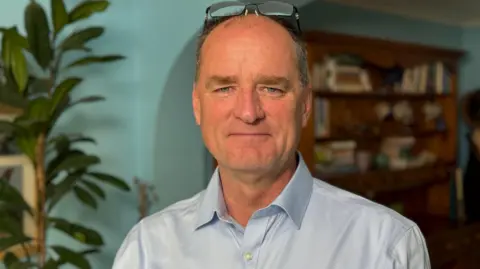 STEVE HUBBARD/BBC
STEVE HUBBARD/BBCBlock booking an entire hotel for five years to use as temporary accommodation is a "sticking plaster", a homelessness expert has said.
Milton Keynes City Council signed a contract to use all 140 rooms of Harben House Hotel, in Newport Pagnell, earlier this year.
John Chesters, who chairs the Milton Keynes Homelessness Partnership, said the move was "not going to solve anything" and more social homes were needed.
Council leader Pete Marland said using the hotel would save the local authority money and "provide a better service".
Mr Chesters said being able to provide the temporary housing was "good, but it's not going to solve anything".
He said the long-term solution was about "proper housing", adding: "Let's move away from this term 'affordable'.
"Let's get some truly affordable, some social accommodation that people can move into because rents are sky high - cost of housing is sky high."
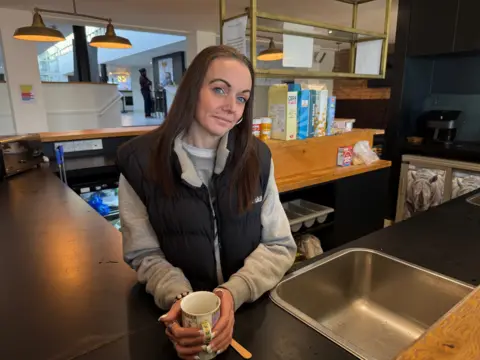 STEVE HUBBARD/BBC
STEVE HUBBARD/BBCKelly, 46, said she had moved into the hotel after a relationship ended and she became homeless for the first time in her life.
The situation had left her feeling "very overwhelmed and scared", but support of other residents at the hotel had "helped get through the anxiety", she said.
On average, 225 people report themselves as homeless in Milton Keynes each month and the council is expected to spend about £19m this financial year on temporary accommodation.
About 85% of short-term accommodation is booked on a night-by-night basis in places like hotels, bed and breakfast venues or flats, the council said.
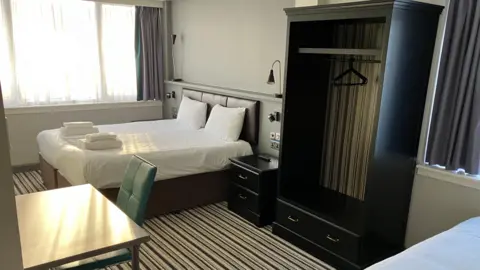 SAM READ/BBC
SAM READ/BBCMarland, the city council's Labour leader, said the irony was that "renting out an entire hotel for five years is cheaper than putting people in single rooms overnight".
He said block booking the hotel meant residents received a "better service" because support workers and housing officers could be based there.
"[We are] one of the biggest council house builders in the country but unfortunately we can't build them at the rate the demand is going up," he said.
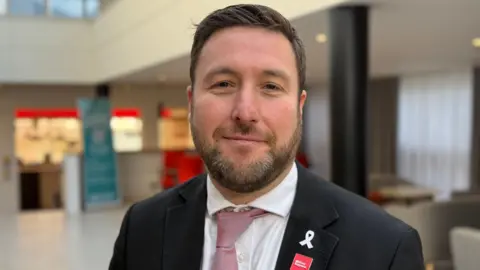 STEVE HUBBARD/BBC
STEVE HUBBARD/BBCThere is a maximum stay of up to 90 days at the hotel while more permanent accommodation can be found.
Air fryers and microwaves in the bar area of the hotel provide the only cooking facilities.
The first residents moved in on 23 September, including single people, couples and single people with children.
One mother living in the hotel with a nine-month-old baby, who did not want to be identified, told the BBC that moving in had been "tough" and she had been against the idea initially.
She said she had changed her mind and received support.
Analysis by Andrew Sinclair, BBC political editor, East of England
Milton Keynes Council is not alone.
According to the Local Government Association (LGA), council budgets everywhere are under "enormous strain" because of the rising cost of providing temporary accommodation.
A survey by the Politics East programme found that South Norfolk council expects to spend £800,000 on providing temporary homes this year. It had only budgeted to spend £300,000.
North Hertfordshire Council is already overspent by £73,000, while in Chelmsford, the city council expects to spend £2.7m more than it had budgeted for.
So every authority is looking for ways to bring down the bill. Some are buying properties rather than paying a hotel or landlord. Breckland Council in Norfolk has turned a former school into flats.
The rise in demand is due to cost of living pressures, more divorces and some private landlords withdrawing from the market.
But the main reason is because the government reimburses councils for most of their costs at 2011 rates. Since then, housing costs have quadrupled.
Last week, the LGA called on the government to raise those rates. The treasury will say that its giving councils more money than ever before.
But everyone agrees this is a problem that needs a long-term solution
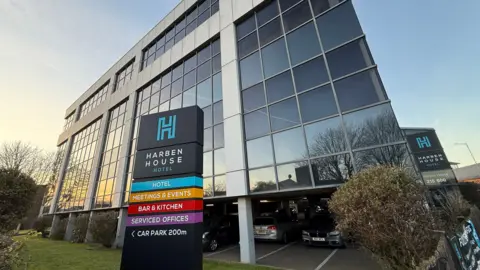 STEVE HUBBARD/BBC
STEVE HUBBARD/BBCA spokesperson at the Ministry of Housing, Communities and Local Government said: "Despite inheriting the worst housing crisis in living memory, we are working at pace to deliver the biggest increase in social and affordable housebuilding in a generation."
It was reforming the planning system and spending an extra £500m on its affordable homes programme, the spokesperson added.
Follow Beds, Herts and Bucks news on BBC Sounds, Facebook, Instagram and X.
